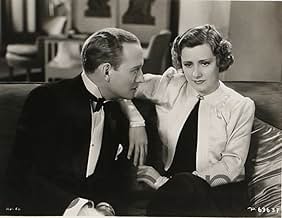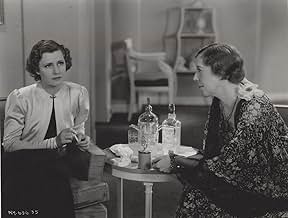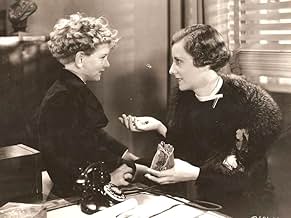अपनी भाषा में प्लॉट जोड़ेंA prison reformer and a controversial judge fall in love and have a child out of wedlock.A prison reformer and a controversial judge fall in love and have a child out of wedlock.A prison reformer and a controversial judge fall in love and have a child out of wedlock.
- पुरस्कार
- कुल 2 जीत
J. Carrol Naish
- Dr. Sorelle
- (as J. Carroll Naish)
Rafaela Ottiano
- Mrs. Feldermans
- (as Rafaella Ottiano)
Wally Albright
- Mischa Feldermans
- (बिना क्रेडिट के)
Margaret Armstrong
- Miss Jones
- (बिना क्रेडिट के)
Irving Bacon
- Waiter
- (बिना क्रेडिट के)
May Beatty
- Nurse
- (बिना क्रेडिट के)
फ़ीचर्ड समीक्षाएं
ANN VICKERS is a bizarre tear-jerker from the early days of sound movies featuring IRENE DUNNE as a woman who is well-intentioned but makes all the wrong choices in life, including the men she thinks she loves.
BRUCE CABOT is her first mistake, a man proclaiming great love for her but abandoning her not long after she bears his child. In a weak supporting role, she treats CONRAD NAGEL as a man she cannot love but values as a friend. He's not too happy about that arrangement.
Then comes married man WALTER HUSTON, unhappily married who finds Dunne a refreshing bit of love interest. She has a career that keeps her busy and stands by him when he is accused of mismanaging funds. He's soon imprisoned but she finds a way to get his case some political attention and eventually he is free to marry her.
That's about it, all handled in dreary fashion with hardly a note of music on the soundtrack to lift it out of the doldrums when it gets too soggy to bear. As social commentary on conditions in the 1930s and women's issues, it's a failure. Miss Dunne plays a social worker who rises to play an important role in the penal system for females.
IRENE DUNNE suffers nobly, but it's a weak vehicle for a strong actress and she can do nothing to give the film a sense of real life struggles. Chalk this one up as a failure, even if it was based on a novel penned by no less than Sinclair Lewis. Evidently, not too much has been retained from his novel.
Summing up: Not worth your time. Any film that wastes the talents of EDNA MAY OLIVER as a Duchess has got to make you wonder what they were thinking. It's her dullest role ever.
BRUCE CABOT is her first mistake, a man proclaiming great love for her but abandoning her not long after she bears his child. In a weak supporting role, she treats CONRAD NAGEL as a man she cannot love but values as a friend. He's not too happy about that arrangement.
Then comes married man WALTER HUSTON, unhappily married who finds Dunne a refreshing bit of love interest. She has a career that keeps her busy and stands by him when he is accused of mismanaging funds. He's soon imprisoned but she finds a way to get his case some political attention and eventually he is free to marry her.
That's about it, all handled in dreary fashion with hardly a note of music on the soundtrack to lift it out of the doldrums when it gets too soggy to bear. As social commentary on conditions in the 1930s and women's issues, it's a failure. Miss Dunne plays a social worker who rises to play an important role in the penal system for females.
IRENE DUNNE suffers nobly, but it's a weak vehicle for a strong actress and she can do nothing to give the film a sense of real life struggles. Chalk this one up as a failure, even if it was based on a novel penned by no less than Sinclair Lewis. Evidently, not too much has been retained from his novel.
Summing up: Not worth your time. Any film that wastes the talents of EDNA MAY OLIVER as a Duchess has got to make you wonder what they were thinking. It's her dullest role ever.
Is anyone in the mood for a cross between Back Street and Night Court? Following those 1931 and 1932 dramas, and combining the stars, comes Ann Vickers, a drama about a strong woman who falls in love with a married man, a judge who doesn't let the law rule his personal life. If you liked both of those precursors, I know what you're renting tonight.
This is an extremely racy movie, and it's a miracle it received a seal of approval from the not-yet mandatory Production Code. The beginning of the film follows Irene Dunne as she has a romance with a soldier, Bruce Cabot. She gets pregnant, and while it's not explicitly spelled out, it's made extremely clear that she goes to Havana to have and recover from an abortion. She's seen resting, wincing, and crying, and no further mention is made of her impending pregnancy. If you don't know how much of a big deal that was to include in a 1933 movie, you're probably not ready to watch it yet.
Her best friend, Edna May Oliver, is another strong female figure from the silver screen, so it's no wonder Irene gets back up on her feet and takes another stab at life. This time, the strong feminist takes a job at a women's prison. This is one of those great silver screen flicks that show how terrible prison conditions were, as well as the interactions between female prisoners and the process of becoming a hardened criminal. Irene tries her hand at drastic prison reform, but since she's a woman and she's trying to improve conditions for women, she's ignored, belittled, and dismissed. This is Irene Dunne, so don't think for a second she'll take that treatment lying down.
Where does Walter Huston come in? you might be asking. I'm sorry to tell you, you're going to have a very long wait ahead of you until he shows up. Keep in mind the movie is called "Ann Vickers" not "Judge Dolphin". He has such talent, it's too bad he doesn't take up more screen time, but since he is so talented, he adds a lot to the scenes he's in. Among the supporting cast, you'll see Conrad Nagel, Mitchell Lewis, Rafaela Ottiano, and J. Carrol Naish. Check this forgotten drama out if you like Irene Dunne, racy pre-Code movies, or early feminist pioneers. This movie is screaming for a remake, so don't be surprised if one of the top modern actresses takes on his powerful role in the future.
This is an extremely racy movie, and it's a miracle it received a seal of approval from the not-yet mandatory Production Code. The beginning of the film follows Irene Dunne as she has a romance with a soldier, Bruce Cabot. She gets pregnant, and while it's not explicitly spelled out, it's made extremely clear that she goes to Havana to have and recover from an abortion. She's seen resting, wincing, and crying, and no further mention is made of her impending pregnancy. If you don't know how much of a big deal that was to include in a 1933 movie, you're probably not ready to watch it yet.
Her best friend, Edna May Oliver, is another strong female figure from the silver screen, so it's no wonder Irene gets back up on her feet and takes another stab at life. This time, the strong feminist takes a job at a women's prison. This is one of those great silver screen flicks that show how terrible prison conditions were, as well as the interactions between female prisoners and the process of becoming a hardened criminal. Irene tries her hand at drastic prison reform, but since she's a woman and she's trying to improve conditions for women, she's ignored, belittled, and dismissed. This is Irene Dunne, so don't think for a second she'll take that treatment lying down.
Where does Walter Huston come in? you might be asking. I'm sorry to tell you, you're going to have a very long wait ahead of you until he shows up. Keep in mind the movie is called "Ann Vickers" not "Judge Dolphin". He has such talent, it's too bad he doesn't take up more screen time, but since he is so talented, he adds a lot to the scenes he's in. Among the supporting cast, you'll see Conrad Nagel, Mitchell Lewis, Rafaela Ottiano, and J. Carrol Naish. Check this forgotten drama out if you like Irene Dunne, racy pre-Code movies, or early feminist pioneers. This movie is screaming for a remake, so don't be surprised if one of the top modern actresses takes on his powerful role in the future.
It is doubtful if, at this point in time, anyone needs to be reminded of the consistent excellence of the versatile Irene Dunne, whose presence enhanced drama, comedy and musical films for many years. ANN VICKERS recalls to us how effective her subtle talent was even early in her career, playing a character alternately strong and vulnerable in a story too crowded with incident to give its major players the room they require to draw the characters fully. As a capable and resolute professional woman involved in social work and prison reform, Dunne's title character is curiously susceptible to the less-than-worthy men she finds more appealing than the steady earthbound types she encounters but does not favor. This contradictions accounts for a large part of the interest in her character, discreetly but firmly abetted by the nuances of yet another outstanding performance. Irene Dunne is perhaps the most reliable of all leading ladies. If you share the admiration of many for her work, this somewhat obscure picture will not disappoint you.
To call Ann Vickers a women's picture may technically be accurate--it was, indeed, adapted by Jane Murfin, also responsible for 1939's The Women--but it's much more than that. Quite simply, this is one of the best dramas ever produced in Hollywood. Written with delicacy and tenderness, yet planted firmly in the cruel realities of life, Ann Vickers includes a tour de force performance by Irene Dunne, ably supported by the wonderful Walter Huston as her lover, and Conrad Nagel and Bruce Cabot as would be paramours. There are some incredibly powerful moments here, especially during the prison scenes, and Dunne and Huston are magical whenever they're on screen together. Certainly daring by the standards of the time, Ann Vickers is a refreshingly honest and still topical masterpiece.
Only three years into her Hollywood career (after the initial misstep of "Leathernecking" (1930), Irene Dunne shines in this pre-Code drama. Her portrayal of Sinclair Lewis' "Ann Vickers" is complex, layered and multi-faceted. She is a modern woman and she is determined to change the world as Edna Mae Oliver's character states "if it takes her all winter". But the world almost breaks her. She is impregnated and then emotionally abandoned by Bruce Cabot's cad "Lafe", sent to work in a Purgatory of a women's prison, and finally saved by the love of Walter Huston's Judge Barney Dolphin. In him, she has met her equal--morally, intellectually, and emotionally. Their love is here to stay, as we see when she not only proudly bears their son out of wedlock but stands by him when he is sent to prison on political corruption and graft charges trumped up by his opposition. She too suffers in that she loses a top-tier professional post and must makes ends meet by writing freelance newspaper articles. However, she is undaunted and toughs it out until such time that Barney is paroled and reunited with her and their young son. It is so refreshing to see Dunne in this early role, so far removed from both the screwball comedy and perfect wife and mother roles she would play in the middle and latter phases of her long career. We mourn with her the loss of her first child, the death of whom is ambiguously depicted as coming about by abortion. We rejoice in her finding her soulmate, Barney and cheer them for their unaffected love and affection and the joy they express over their impending parenthood. While this is a "weepie", the Queen of which she would become, Dunne's performance is superior to that of her similar roles of this era. Her talent is just as complex and strong as that of her character and she inhabits the role exquisitely.
क्या आपको पता है
- ट्रिवियाSome objections were made by the Hays Office concerning the plot of the first draft of the screenplay, where Ann marries Captain Resnick and then has an affair with Barney. The plot was changed to Ann being seduced by the Captain with the offense somehow deemed less if only one of the parties in the adulterous affair is married. No reference is made about any abortion in the trip to Havana, and in the released print the cause of death of Ann's baby girl is never mentioned. RKO applied for an "Approved" certificate in 1935, when the production code was more rigorously enforced, but they were informed that no certificate would be given because of the film's attitude towards adultery.
- गूफ़Although the first part of the picture takes place in 1918, all of Irene Dunne's hairstyles and clothes are strictly in the 1933 mode, and continue as such through the decade of the 1920s which follows.
- भाव
Barney Dolphin: [last lines]
Matthew Dolphin: Who are you?
Barney Dolphin: Well, son, i refuse to answer without advice of counsel.
- क्रेज़ी क्रेडिटThe opening credits are printed in the pages of the novel. They are revealed by a man's hand opening the book and turning the pages.
- साउंडट्रैकSmiles
(1917) (uncredited)
Music by Lee S. Roberts
Lyrics by J. Will Callahan
Played by a band for dance music at the Lorlears Hook Settlement House
Whistled by Sam Hardy
Danced by Sam Hardy and Helen Cromwell and other couples
टॉप पसंद
रेटिंग देने के लिए साइन-इन करें और वैयक्तिकृत सुझावों के लिए वॉचलिस्ट करें
विवरण
- रिलीज़ की तारीख़
- कंट्री ऑफ़ ओरिजिन
- भाषा
- इस रूप में भी जाना जाता है
- Sinclair Lewis' Ann Vickers
- फ़िल्माने की जगहें
- उत्पादन कंपनी
- IMDbPro पर और कंपनी क्रेडिट देखें
बॉक्स ऑफ़िस
- बजट
- $3,03,000(अनुमानित)
- चलने की अवधि1 घंटा 16 मिनट
- रंग
- पक्ष अनुपात
- 1.37 : 1
इस पेज में योगदान दें
किसी बदलाव का सुझाव दें या अनुपलब्ध कॉन्टेंट जोड़ें


































